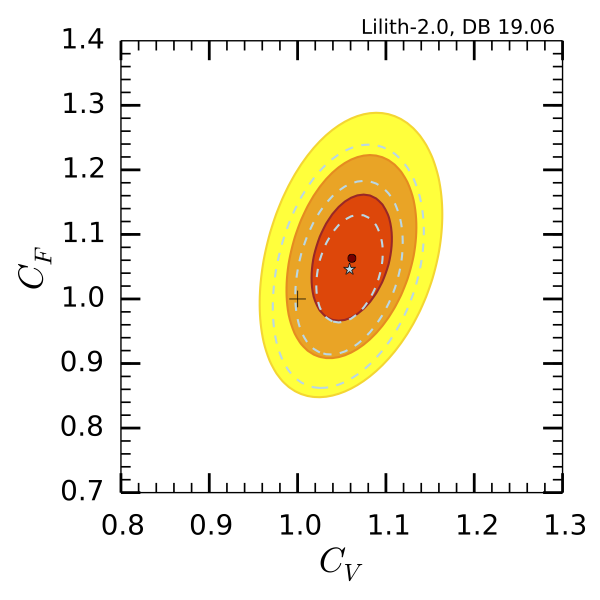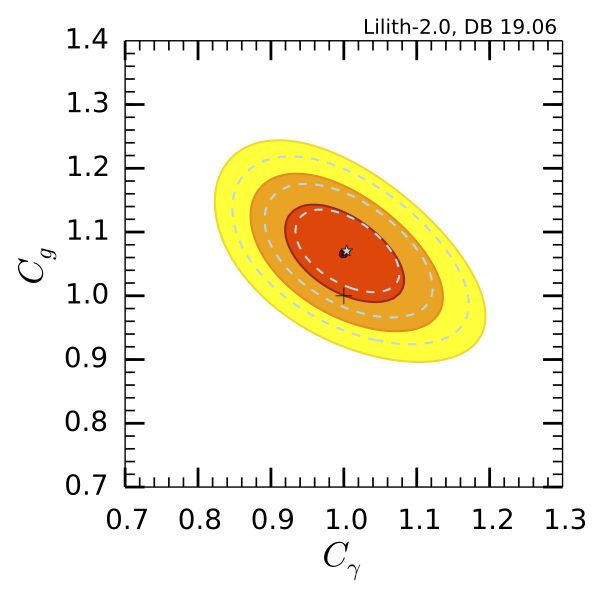A tool for constraining new physics from Higgs measurements
Version 1 (2015) by Jérémy Bernon and Béranger Dumont
Version 2 (2019) by Sabine Kraml, Tran Quang Loc, Dao Thi Nhung and Le Duc Ninh
About
Lilith (Light Likelihood Fit for the Higgs) is a light and easy-to-use Python tool for constraining new physics from signal strength measurements of the 125 GeV Higgs boson. Lilith is provided with the latest experimental measurements from the ATLAS and CMS collaborations at the LHC and from the Tevatron. The Higgs likelihood is based on experimental results stored in an easily extensible XML database, and is evaluated from the user input, given in XML format in terms of reduced couplings or signal strengths.
Current code version: Lilith-2.0.0 (July 2019)
Current database version: 19.09 (Sep. 2019)
Download: Lilith-2 on GitHub
Information on the versions can be found in the changelog.
Previous versions: Lilith-1.1 hosted on Launchpad
Lilith-2.0 includes the ATLAS and CMS Run-2 results for 36/fb and, among other improvements, a better treatement of asymmetric uncertainties.


Constraints in the planes (CV, CF) and (Cg, Cγ) using the experimental dataset as of June 2019 (DB-19.06);
the solid filled (dashed) contours show the 68%, 95% and 99.7% CL regions obtained from the Run 2 (Run 2 + Run 1) results.
Usage
See the original Lilith manual, arXiv:1502.04138 for the primary description
and arXiv:1908.03952 for the extensions in v2.0.
Please cite both these papers when you are using Lilith for your work!
For usage in micrOMEGAs, see arXiv:1606.03834.
NB Lilith-2.0 works out of the box in micrOMEGAs v4.3 or higher.
Prerequisites
Lilith requires Python 2.6 or more recent (but not the 3.X series).
It also requires the standard scientific libraries for Python:
SciPy 0.9.0 or more recent, and NumPy 1.6.1 or more recent.
The Python example codes doing a likelihood profile analysis require
iminuit.
Finally, the (optional) embedding of Lilith within a C, C++ or ROOT code requires the libraries and header files for Python development.
The easiest way to check if all dependencies of Lilith are correctly installed is to try to compute the likelihood from an example file.
After unpacking the archive of Lilith, this can be achieved by typing to the shell (with current directory Lilith-2.0/) the command
python run_lilith.py userinput/example_couplings.xml
More information on how to install these dependencies can be found in Section 4.1 and 4.4 of arXiv:1502.04138.
Early versions
The publication Status of the Higgs couplings after Run-1 of the LHC using Lilith 1.0,
Phys.Rev. D90 (2014) 071301, was based on an early version, Lilith 1.0.
Lilith 1.0 (September 2014)
and Lilith 1.0.1 (November 2014)
are not maintained anymore and differ significantly from the release version 1.1. Moreover, these versions are not compatible with any database of experimental results shipped on Launchpad (v1.1) or GitHub (v2.0).
Talks
Talks on Lilith-2
- Tran Quang Loc, 44th Vietnam Conference on Theoretical Physics (VCTP44), 1 Aug 2019 [slides]
The main features of Lilith-1.1 were summarized in the following talks:
- Jérémy Bernon, 3-PAC seminars, Imperial College London, United Kingdom, 27 February 2015 [slides]
- Béranger Dumont, Higgs as a Probe of New Physics 2015, University of Toyama, Japan, 11-15 February 2015 [slides]
- Jérémy Bernon, Preparing for Higgs Boson Studies with Future LHC Data, DESY Hamburg, 22-24 October 2014 [slides]
- Béranger Dumont, Higgs Hunting, Orsay, 21-23 July 2014 [slides]
- Jérémy Bernon, GDR Terascale, Palaiseau, 2-4 June 2014 [slides]
- Jérémy Bernon, Implications of 125 GeV Higgs Boson, LPSC Grenoble, 24-28 March 2014 [slides]